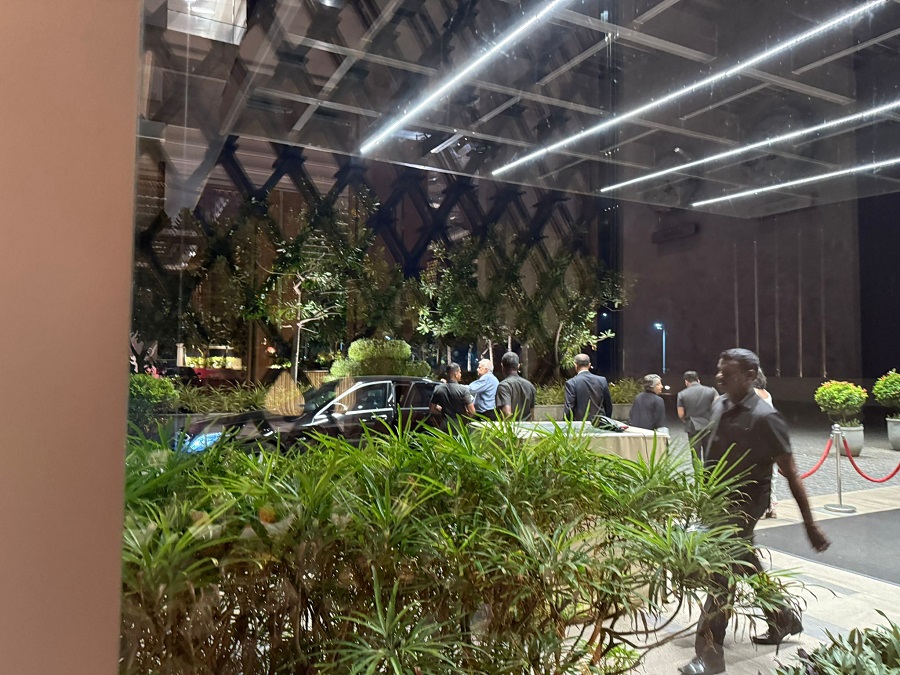-By LeN Political Correspondent

(Lanka-e-News -30.July.2025, 11.20 PM) In the shimmering candlelight of Colombo’s diplomatic quarter, what should have been an inconspicuous dinner became political theatre. Former President Ranil Wickremesinghe — once Sri Lanka’s evergreen statesman, now largely reduced to a walking footnote — was seen making a discreet early exit from a private dinner on Thursday night, hosted at a well-known residence.
Eyewitnesses say he was accompanied by a familiar female figure in Colombo’s diplomatic social circles, though the nature of the engagement appeared more political than personal. What followed, however, was not just a premature end to a meal — but perhaps an unofficial epilogue to a long, complicated career.
Ranil, whose decades-long grip on the United National Party (UNP) once made him the most influential civilian in post-war Sri Lanka, now appears to be dining out on past relevance. In the aftermath of a humiliating electoral drubbing and a stinging exposé aired by Al Jazeera earlier this year, the elder statesman has become something of a ceremonial ghost — entitled, funded, but politically abandoned.
In Parliament, his name is not called — simply because he has no seat to answer to. In party meetings, his shadow looms large but his voice carries little weight. And yet, Wickremesinghe, ever the illusionist, continues to present himself as the sage of Sri Lankan democracy — offering unsolicited advice and incongruent lectures to anyone still willing to listen.
But the political dinner circuits of Colombo are whispering louder than ever: Is there anything left of Ranil’s political capital, or is he merely surviving on the State’s rupee and borrowed time?
Since stepping down from the presidency, Mr. Wickremesinghe has retained the trappings of high office — a taxpayer-funded staff, armed security escorts, and access to government perks. Critics argue that this is emblematic of the broader rot in Sri Lankan political culture — a class of leaders who retire with state pensions but leave behind unpaid political bills.
“The UNP is now a party with no ground game, no voter base, and no identifiable future. It’s a boutique with no customers,” remarked a senior Western diplomat, speaking on condition of anonymity. “Ranil has turned it into a personal fiefdom, and then forgot to invite the villagers.”
That once-proud party, which led the country through war, reform, and at times even hope, is now nothing more than a corporate logo on a dilapidated office building in Sirikotha. No MPs. No local council power. Just one honorary chairman wandering the corridors, occasionally bumping into a portrait of J.R. Jayewardene and wondering where it all went wrong.
Yet the past is not done with Wickremesinghe.
The long-dormant Batalanda Commission allegations — involving alleged torture camps and paramilitary activity during the late 1980s — have seen a curious revival under the current government. What was once considered buried history is now being examined under a harsher, more populist lens.
And Wickremesinghe, who narrowly dodged full legal scrutiny during his prime, may find the institutional patience for his evasions has finally expired.
Adding to the fire, watchdog groups are also questioning the financial entitlements Mr. Wickremesinghe continues to receive as a former head of state, particularly when he occupies no formal role and exerts no tangible benefit to the public. One report by the Public Accounts Committee raised eyebrows at nearly LKR 52 million in annual expenditures attributed to the former president’s office — a figure that includes luxury vehicles, fuel, and overseas travel.
“This isn’t about legality anymore. It’s about morality. He presided over a collapse and then stayed for dessert,” said a member of the Civil Society Collective.
It remains to be seen whether Wickremesinghe intends to return to electoral politics or fade into a more ceremonial role. For now, the UNP remains in limbo, and Ranil remains its sole custodian — like a man guarding a museum of irrelevance.
Some within Colombo’s political salons believe Wickremesinghe is attempting a slow, backroom comeback — not necessarily for office, but for relevance. But with the rise of younger political actors and the growing momentum behind movements like the NPP, the space for recycled leadership is shrinking.
As he exited that Colombo dinner last week, it may not have been just another social goodbye — it might have been the political endnote of a man who once believed he could outwit history.
Now, even history seems to have left the table.
---------------------------
by (2025-07-30 18:55:11)
Leave a Reply